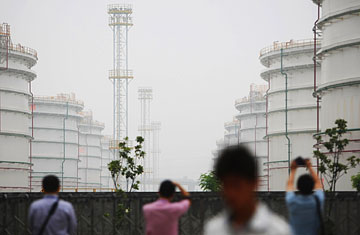
People photograph oil tanks at Zhenghai National Oil Reserve Base on June 3, 2009 in China's Zhejiang province
Though it may not be obvious, there is a reason for this raw materials rebound: blame China. The world's third-largest economy (some predict China will overtake Japan next year to become the second-largest) has been on a commodities buying spree this year. And when China is buying, markets move. The country's economy — which is roughly a third the size of that of the U.S. — consumes roughly 40% of the world's copper, about 43% of global steel, nearly half of the world's soybeans, and is a major buyer of a host of other commodities.
The collapse of the global economy has only exacerbated this trend. As demand evaporates in nearly every other corner of the world, China's economy has kept growing, thanks in part to the government's $585 billion stimulus package, much of which is being spent on commodities-intensive construction of roads, bridges, and public utilities. As a result, China has gone from being one of several major global players on the demand side to an 800-pound gorilla, and will remain so for years to come, analysts say.
There are other reasons the gorilla is buying. After prices of many natural resources crashed in mid-2008, China swooped in to build up its strategic stockpiles of natural resources when prices were low. The Beijing government became extremely sensitive to commodity price inflation after domestic companies were badly hurt by previous price spikes. The country "learned its lesson that they have to do something when prices are low to ensure having raw materials for its next expansion," says Judy Zhu, commodities analyst with Standard Chartered Bank.
But there's a darker side to China's appetite, beyond moves that would appear to be merely prudent. Some economists warn this year's commodities price spikes are being fueled by Chinese speculators who are borrowing heavily to finance their bets. Credit is surprisingly easy to come by in China now. That's because last year, amid the global financial crisis, Beijing began urging the country's banks to increase their lending in order to prevent reduced capital flows from strangling the economy. And when Beijing says Jump, Chinese banks haul out the trampoline: In the first four months of 2009 alone, China's banks issued some $757 billion in new loans, more than were issued in all of 2008.
That flood of money is driving speculators to pour money into assets like commodities, says Andy Xie, an independent Shanghai-based economist. Xie estimates that over one-third of China's commodities imports of late have been for speculative purposes; companies are buying raw materials and simply warehousing them in anticipation of selling them later after prices have risen some more.
Because this demand is not supported by a fundamental improvement in economic activity, it will lead to problems later on, Xie argues, either by fueling inflation or by pumping up a speculative commodities bubble that is bound to cause more pain when it deflates. "When the government decides to tighten its lending, then commodities will fall," Xie says.
There are already signs of fatigue as commodity prices have begun to ease; market chatter suggests China's imports of materials such as copper waned in June. This may be another bit of bad news for those who think China's relatively robust economy and its hunger for commodities is an early sign of a global recovery. As Xie wrote in a recent report: "Forecasters wrongly assume that recent asset appreciation, fueled by speculation, signals an end to the economic problems. That's an illusion. [China's] lending surge may have created more problems than it resolved." And when the gorilla puts a foot wrong, there's no predicting who's going to get squashed.
